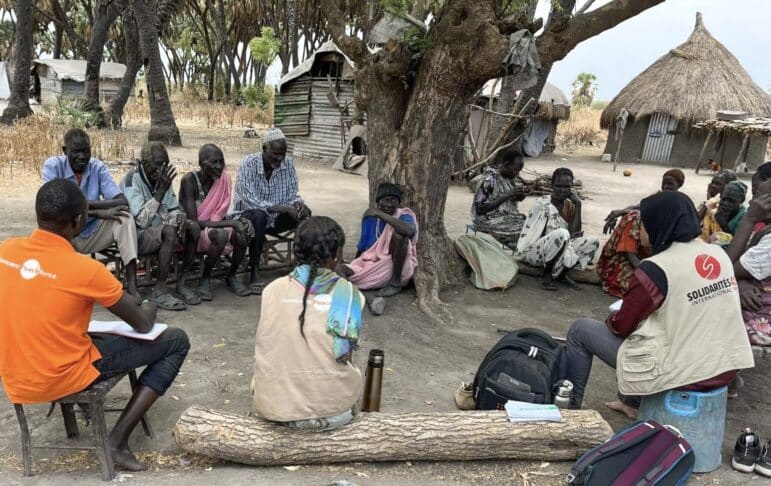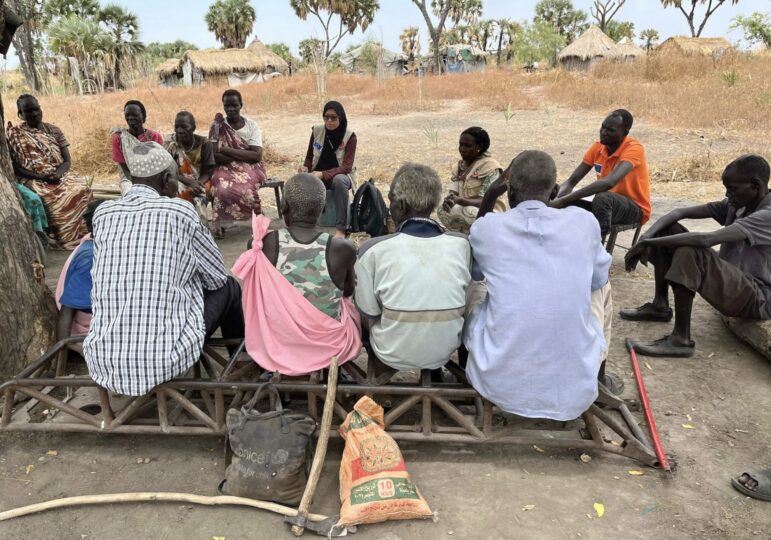Working Side-by-Side: Communities Lead the Way in South Sudan
"We used to simply let our leaders handle conflict resolution on their own."

The more resilient our communities are, the better equipped we are to prevent and respond to challenges brought on by climate-related disasters, armed conflict, and the displacement that follows.
Recognizing this, NP and Solidarités International (SI) began reaching out to and forming partnerships with different villages and townships. For the past few months, our joint project has been focused on building community resiliency: building trust between neighbors, finding solutions for safe and secure access to food, advocating for gender equality, supporting displaced communities, and more.
But we won't do anything that isn't explicitly community-led.
At first, we would hold meetings with community members and leaders, but we didn't want to go any further without ensuring that community members were involved on a more regular basis. That's why we worked to form inclusive "advisory boards" that meet on a monthly basis.
"We can make significant contributions"
Each township's advisory board is made up of a chief, local religious leaders, youth leaders, women leaders, and prominent community representatives, including people with disabilities.
"We used to simply let our leaders handle conflict resolution on their own, but after training, my fellow women and I realized that we can make significant contributions to conflict resolution and violence prevention in our communities," shared Martha*, one of the members of an advisory board.
They are closely involved in the project implementation and provide frequent feedback on the effectiveness of the project. Insights from community members themselves also allow NP and SI to make improvements to the team's outreach based on their needs.
“We appreciate that NP is collaborating with us to determine the training requirements necessary to increase our capacities in the community," Martha reflected on how her participation in the board has shaped the project.
Growing Together
At Kuok village's recent advisory board gathering, the members acknowledged the value of NP and SI's trainings on conflict resolution and violence prevention. Many community members shared personal experiences of growth in confidence and capabilities. They also highlighted the need for continued advocacy:
“We have often voiced our concerns about the difficulties we face in the community, particularly with regard to health and education services, but we have received no response from other humanitarians," shared Nyuon*, one of the youth leaders. "We implore you [SI/NP] to continue to speak out and not give up until we receive support.”
At Warjwok Boma's latest advisory board meeting, the local chief expressed great delight with NP and SI, noting the teams' ability to gain the community's trust, understand their challenges, and advocate for additional humanitarian assistance.
"Initially, it was difficult for board members to act impartially when handling disputes, due to preexisting relationships with community members," he shared. "Since undergoing training with NP and SI, the board has strengthened their ability to respond to conflicts—they've come to recognize the importance of finding solutions that create value and benefits for everyone involved."
"All of the trainings conducted by NP were carefully selected and delivered at the appropriate time, based on the community's needs," he continued. "Community members have expanded their knowledge of conflict resolution and violence prevention, in addition to learning specific skills to prevent conflict, including negotiation and conversational turn-taking."
* * *
This activity is a part of our project with Solidarités International (SI) to support community resilience and nonviolent conflict management in conflict and flood-affected areas of Upper Nile and Jonglei States, South Sudan, which is funded by the European Union and supporters like you.
*Names changed


